John Deere 4066M Compact Utility Tractor

| Make | John Deere |
| Model | 4066M |
| Type | 4-Family Compact Tractors |
Your Preferred Location
Description
Turbocharged diesel engine
PowrReverser™ or eHydrostatic Transmission options
Standard 4-wheel-drive
Category 1, 3-point hitch compatible with iMatch™ Quick-Hitch
Models
PowrReverser™ transmission allows for clutchless direction changes
PowrReverser transmission allows for clutchless direction changes
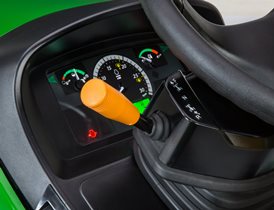 PowrReverser transmission lever
PowrReverser transmission lever
The 12/12 PowrReverser transmission is available on the 4M and 4R Tractors.
The PowrReverser transmission offers a hydraulically shifted forward-to-reverse transmission. This allows for clutchless shuttle shifting between forward and reverse with one lever for quick and easy direction change.
- PowrReverser transmission does not require the operator to use the clutch to shift between forward and reverse
The PowrReverser transmission features a hydraulically actuated wet clutch. Two multi-disk clutch packs (one forward and one reverse) are hydraulically engaged when the directional (reverser) lever is placed in either the forward or reverse position.
Each clutch pack consists of three large, 5-in. diameter clutch disks that operate in oil and are oil-cooled, allowing excellent heat dissipation and extended clutch life.
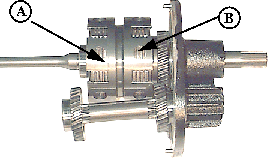 Forward/reverse clutches
Forward/reverse clutches
- Clutch A is used for the forward operation of the tractor
- Clutch B is used for the reverse operation of the tractor
Key features of the PowrReverser transmission:
- 12 forward/12 reverse (12F/12R) speeds
- Reverser lever, located on the left side of the instrument console, allows the operator to make direction changes without clutching
- Fast shuttle shift for improved loader operation
- Dual-cone synchronizers allow for synchronized shifts between gears for on-the-go shifting with the use of the clutch
- Dual-cone synchronizers permit on-the-go, low-effort shifting between gears
- Helical-cut gears for quiet operation
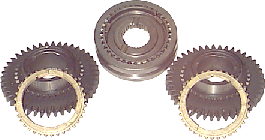 Helical-cut gears
Helical-cut gears

- Well-spaced speeds for turf, loader, and transport work
- Neutral start switch prevents tractor from starting when transmission (main range) is not in neutral
- Dual wet-disk clutches provide long clutch life
- Shifts between ranges are not synchronized
- PowrReverser transmission models have both hand and foot throttle controls
- Especially handy when using a loader
Maximize productivity with an eHydro™ transmission
The tractor is available with a three-range electronic hydrostatic (eHydro) transmission.
- Fluid under pressure transmits engine power to the drive wheels using a pump and motor
- Functions both as a clutch and transmission
- Provides high torque for startup
- Reduces powertrain shock loads
Danfoss® company supplies both the pump and motor. This ensures that the components are matched to each other, providing maximum efficiency.
The electronic hydrostatic transmission is ideally suited for jobs where productivity is a must, such as loader or mower applications.
Twin Touch™ foot controls allow the operator to select both directions of travel and speed with a touch of the toe.
Key features of the eHydro transmission:
- Infinitely variable ground speeds, in each range, allow the operator to match the speed of the tractor to the job.
- No clutching for fast and easy direction changes
- Twin Touch foot pedals for quick and easy forward/reverse operation
- Cruise control is optional equipment
- Cruise control switch is located on the right-hand console for easy access
- Cruise control is electronically engaged and disengaged, which allows for precise setting of speed
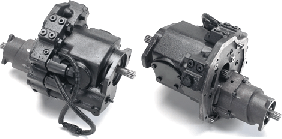 Danfoss eHydro transmission
Danfoss eHydro transmission

Danfoss eHydro transmission is used for reliable operation. Durability features include:
- Large forged trunnion shaft with larger support bearings that reduce vibration and noise.
- Center section made from ductile iron (much stronger than grey iron used in many competitive transmissions).
- Transmission oil cooler cools transmission oil for longer transmission life.
Safety features of the eHydro transmission include:
- The tractor will start with one or both foot pedals depressed, but it will not move until both pedals first return to neutral
- Operator presence - the tractor will come to a stop if the operator leaves the seat but will not shut off unless the power take-off (PTO) is also running
Key John Deere advantage
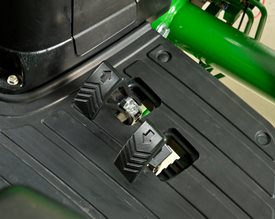 Twin Touch foot controls
Twin Touch foot controls

John Deere's Twin Touch foot controls offer several key advantages over competitive hydro model tractors.
- Some competitive hydrostatic tractors use a treadle pedal (toe-heel) design foot control for operation of the hydro
- Requires the operator to use both toe and heel to change direction, resulting in increased operator fatigue
Optional cruise control
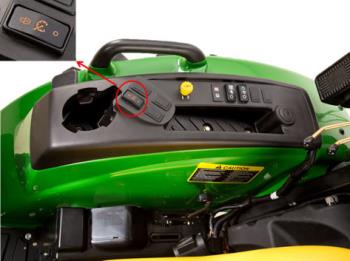 Optional cruise control on 4M Tractors
Optional cruise control on 4M Tractors

A true-speed cruise control is optional equipment on 4M Tractors with eHydro transmission. Cruise control is electronically engaged and disengaged and is located on the operator console to the right of the operator.
- Maintains desired forward speed without pressure on the foot pedal
- Cruise control is set by engaging the switch when the desired speed is reached
- A speed sensor also allows the tractor to maintain preset speed driving up and down hills
- To disengage the cruise control, either:
- Apply pressure to the turn brakes opposite the eHydro pedals
- Disengage cruise control switch
- Briefly depress the reverse control pedal
LoadMatch™ power management system
LoadMatch is a standard feature on the 4M Series Tractors.
If torque requirements increase significantly, the transmission will reduce the tractor's drive speed to compensate for the increased load on the transmission, maximizing torque to drive wheels and minimizing stalls.
Controls automatically adjust LoadMatch compensation depending on the tractor’s application. PTO applications require less engine speed fluctuation, therefore adjusting the amount of droop depending on PTO speed. This adjustment increases efficiency and optimizes engine speed and torque output based on tractor application.
While typically left on, LoadMatch can be turned off through the center console display.
MotionMatch™ system
MotionMatch, standard on the 4M Series Tractors, is adjustable through the center console display. It offers variable adjustments to either lengthen or shorten the rollout when the HST pedal is depressed or released.
Serial number break information
All model year 2016 and newer tractors with serial numbers after those listed below are equipped with LoadMatch and MotionMatch features from the factory
- 4044M: 1LV4044MCGG100594
- 4052M: 1LV4052MVGG100273
- 4066M: 1LV4066MHGG100181
For model year 2016 tractors with serial numbers before those listed above and previous model year tractors, these features are available with a machine software update.
Danfoss is a trademark of Danfoss Incorporated.
Attractive styling provides improved visibility and serviceability
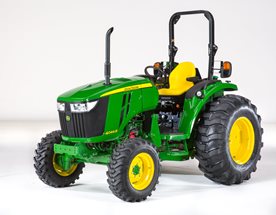 4R Tractor
4R Tractor

The bold styling of the 4M and 4R Tractors provide an attractive and functional appearance similar to that of the larger agricultural tractors. Benefits of this styling include:
- Easy tractor family identification
- Updated fixed grille and side panel hood design allows for optimum sealing of the cooling compartment
- Front grille slides up to an integrated maintenance position for easy battery access
- Easily removable cowl, allowing for serviceability access
- Wraparound-style halogen headlights
- Premium integrated automotive style headlight bezels
- Bold graphics
- Aggressively sloped hood design, giving a softer, smoother look and providing improved visibility
- Hybrid exhaust in base on cab tractors for clear operator visibility and safety
- At low speed and when tractor is in a filter cleaning process, exhaust will be routed through vertical exhaust outlet. In all other cases, the exhaust will be routed through the downward exhaust outlet.
- Side exhaust in base on open operator station tractors and ensures minimal heat impact to operator
The result gives the tractor a distinctive appearance and feel.
NOTE: If the tractor is equipped with an optional field-installed vertical exhaust, exhaust pipe must be removed before opening and closing the hood of the tractor.
Excellent serviceability reduces operational costs and improves productivity
Regular service and maintenance are essential to the performance, productivity, and longevity of the tractor.
- Easy access to regular service points minimizes service time.
- Easily removable cowl and side panels, improved hood design, and integrated maintenance position on the grille provide easy accessibility for routine maintenance.
- Tractors are equipped with extensive onboard self-diagnostic capabilities and are fully compatible with John Deere’s exclusive Service ADVISOR™ system.
- Daily service requirements are minimal and simple to accomplish. Most service interval requirements can be performed with a basic understanding of procedures and common tools.
- Improved cost of ownership
- Hydraulic oil service interval changed from 400 to 1200 hours (or 3 years) when using Hy-Gard™ products
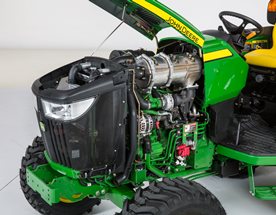 Removable side panels
Removable side panels
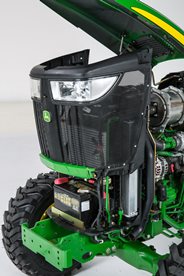 Integrated grille maintenance position
Integrated grille maintenance position
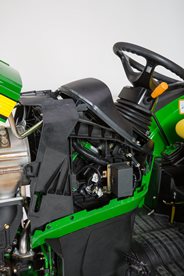 Removable cowl
Removable cowl
All items in the daily service schedule can be performed without the use of tools:
- Engine oil, hydraulic oil, coolant level, and the water separator can be conveniently accessed
- The engine can be easily accessed by simply raising the hood for more periodic maintenance checks
- A single-point latch mechanism and self-contained leash ensure easy hood opening and closure
NOTE: Always refer to the operator’s manual for complete maintenance and service recommendations.
Built-in safety features for operator peace of mind
Safety is designed into all 4M and 4R Series Tractors.
- Operator presence system ensures the operator is in the seat to run the tractor
- If the operator leaves the seat when front or rear power take-off (PTO) is engaged, the engine shuts down.
- For stationary PTO work, the tractor must be in neutral and the park brake fully set.
- The rollover protective structure (ROPS) is designed for operation safety
- Reflective ROPS strips for better tractor visibility
- Key switch interlock prevents bypass starting
- Visual PTO warning light alerts operator when rear PTO is running
- Placing the transmission in neutral and setting the park brake allows operator to run rear PTO safely when off the tractor seat
- Turn signal and flashing warning lights operate according to ASAE S279.10 standard
- Taillights for road transport
- Slow moving vehicle (SMV) sign for road transport
Operator station is comfortable and convenient
Addition of optional center console toolbox
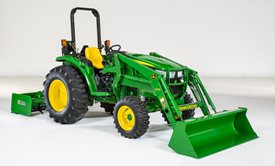 Easy entry and exit from the operator's station
Easy entry and exit from the operator's station

The operator's station is designed for easy entry and exit from the tractor.
Conveniently placed brake pedals, as well as repositioned operator controls, provide for a clean and flat platform design giving the operator plenty of legroom.
- Hood and fenders are made from impact-resistant polymer material designed to eliminate the possibility of rusting and to resist dents that can occur with metal hoods or fenders.
- The hood is painted to an automotive-like finish, providing a high-luster appearance with excellent resilience and resistance to fading from sunlight.
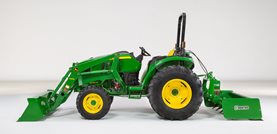 Comfortable and convenient design
Comfortable and convenient design

Key features of the operator's station include:
- Large grab handles on each fender make getting on and off the tractor easy.
- Controls are shape and color-coded for easier identification and operation.
- Optional mechanical suspension seat improves operator comfort and reduces fatigue.
- A left-side step is in base equipment to enhance access to the operator's station.
- The mechanical suspension seat gives the operator a comfortable ride. The seat flips forward for protection from the elements.
- Seat suspension is adjustable for the operator's weight and height.
- Operator weight adjustment adjusts to the operator’s weight 52 kg to 125 kg (115 lb to 275 lb).
- The seat is adjustable fore and aft for the operator’s height using the lever located under the seat.
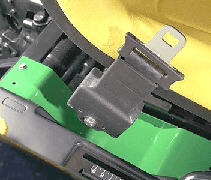 Retractable seat belts
Retractable seat belts

- Retractable seat belts prevent belts from becoming tangled in seat suspension and controls
Powerful Yanmar® diesel engine delivers plenty of power under heavy loads
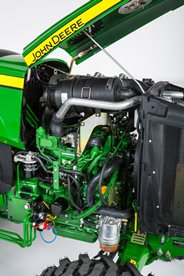 Powerful Yanmar engine
Powerful Yanmar engine
The Yanmar diesel engine has a high-torque reserve that provides plenty of power under heavy load.
This 4-cylinder engine features lower levels of exhaust emissions and reduced noise levels. It meets EPA Final Tier 4 (FT4) emission standards.
Model |
Number of |
Engine |
Aspiration |
Rated |
Gross engine |
Gross engine ps* |
PTO hp |
4 |
2.2 L |
Natural |
42.5 |
43.1 |
32.5 |
||
4052M/R |
4 |
2.1 L |
Turbocharged |
50.8 |
51.5 |
39.9 |
|
4066M/R |
4 |
2.1 L |
Turbocharged |
2600 |
65.0 |
65.9 |
52.0 |
Displacement, cu in. (L):134.25 (2.2)
*Engine hp (kW), gross SAE J1995: 51.5 (37.9) at 2600 rpm, PS
Displacement, cu in. (L):128.15 (2.1)
*Engine hp (kW), gross SAE J1995: 65.9 (48.5) at 2600 rpm, PS
Displacement, cu in. (L):128.15 (2.1)
The engine uses the latest technologies to optimize fuel economy, improve control and accuracy, and reduce environmental impact.
The common rail system (CRS) optimizes fuel economy and reduces operating costs*. High-pressure injection atomizes fuel into finer particles which burn more completely. It results in improved fuel economy and lower cost of operation.
The electronic control unit (ECU) provides optimum fuel control and accuracy. ECU monitors and controls the engine. It continuously monitors engine conditions and adjusts the fuel delivery accordingly to ensure optimum performance and emissions.
The new engine comes with an after treatment system. The system operates automatically. The exhaust filter consists of a diesel particulate filter (DPF) which captures particulate matter (PM) contained in the exhaust gas. Using a natural cleaning process, most of the PM trapped in the exhaust filter is eliminated by the heat of the exhaust stream generated by normal use. In situations of low temperature, engine speed or load factor, an active cleaning cycle is initiated. In this cleaning cycle, the exhaust gas temperature is raised by injecting additional fuel during the exhaust stroke of normal vehicle operation to the diesel oxidation catalyst (DOC).
After many hours of use, the exhaust filter may require an ash removal service.
NOTE: *As compared to engines not using CRS technology.
DPF cleaning
Depending on the load that the tractor is under, as well as ambient temperature, humidity, and engine speed, the DPF may build up with particulate matter, thus requiring cleaning. Filter cleaning is determined by one of three conditions:
- A prescribed time-based estimation of needed filter cleaning
- DOC/DPF pressure sensors
- A particulate matter buildup estimation based on load conditions
Once one of the three conditions has been met, filter cleaning will occur.
There are three different types of filter cleaning processes:
- Passive filter cleaning
- Active filter cleaning
- Parked filter cleaning
Passive filter cleaning
Passive filter cleaning occurs naturally when the engine is generating enough heat to oxidize particulate matter. This automatic process occurs continuously during normal operating conditions. No tractor icons or symbols appear on the display during passive filter cleaning.
NOTE: Passive filter cleaning requires no operator involvement, and there is no interruption to tractor operation.
Active filter cleaning
If conditions (temperature, load, or speed) for passive filter cleaning cannot be achieved, then PM is removed using active filter cleaner.
To achieve the required conditions, exhaust temperature management (ETM) manages the initiation and duration of active filter cleaning. ETM can adjust numerous engine parameters and/or inject a small quantity of fuel into the exhaust stream for a short duration. The fuel turns to vapor and chemically reacts with the catalysts in the DOC to create heat to oxidize PM.
It is important to note that at no time is the fuel in the DOC/DPF ignited, and there is no flame within the DOC/DPF.
Like passive filter cleaning, active filter cleaning requires no operator involvement, and there is no interruption to tractor operation.
Parked filter cleaning
In some instances where passive and active filter cleaning have not fully cleaned the PM from the system, a parked filter cleaning may need to take place. Most likely, the only time a parked filter cleaning will need to occur is when automatic filter cleaning has been disabled for an extended period of time and multiple warnings to engage filter cleaning were ignored or if the tractor has been used during light load conditions. Additionally, when the automatic filter cleaning process has been deliberately interrupted multiple times, or if active filter cleaning has failed numerous times due to a failed component, a parked filter cleaning may be requested. In these rare instances the operator will have to park the tractor and start the filter cleaning process.
The parked filter cleaning process needs to be activated based on usage and operation of the tractor. The process will take approximately 30 minutes. See operator’s manual for more details.
This system constantly monitors the soot level of the tractor, making sure the tractor is always in peak performance condition. This ensures high performance at all times.
NOTE: Number of hours since last regeneration and soot level percentage viewable on LCD display.
Key features of the engine are:
- Lower rated speed for 540 rpm power take-off (PTO) operation means better fuel economy, less noise and vibration, and longer overall engine life
- Cast-in-block cylinder design for good cooling and long life
- Hydraulic lifters are quieter and require no adjustment
- Heavy-duty crankshaft provides more bearing surface area for added durability
- CRS optimizes fuel economy, lowering the cost of operation
- ECU provides optimum control and accuracy
- Direct fuel injection
- Improves starting
- Injects fuel directly on top of pistons for more efficient combustion
- Develops more horsepower per gallon of fuel
- Glow plugs (cold starting aid)
- Engine oil cooler, cools engine oil for longer engine life
- Key start and shutoff eliminates fuel shutoff knob
- Electric solenoid shuts fuel supply off immediately when key is turned off
- See-through coolant recovery tank permits operator to check coolant level without removing radiator cap
- Sealed radiator compartment keeps trash and debris on outside of hood
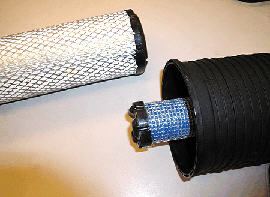 Dry-type air cleaner
Dry-type air cleaner

- Dry-type air cleaner with safety element and electronic air service indicator
- Electronic air restriction indicator alerts operator when air filter servicing is required
- Dual-element design for added engine protection
- Easy to service
- Standard side exhaust
- Discharges fumes away from the operator, reducing engine noise
- Improves operator visibility when using a loader or front implement
- Optional vertical exhaust
Yanmar is a trademark of Yanmar Company Limited.
Optional iMatch™ Quick-Hitch allows for easy implement hookup
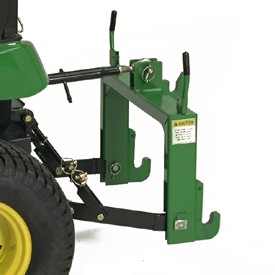 iMatch Quick-Hitch
iMatch Quick-Hitch
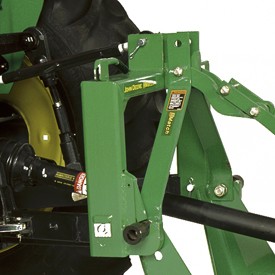 iMatch Quick-Hitch with rotary cutter hookup
iMatch Quick-Hitch with rotary cutter hookup
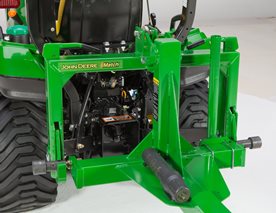 iMatch Quick-Hitch (LVB25976)
iMatch Quick-Hitch (LVB25976)
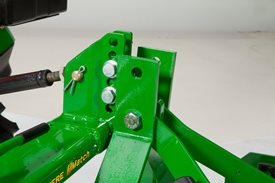 iMatch Quick-Hitch with rotary cutter hookup (LVB25976)
iMatch Quick-Hitch with rotary cutter hookup (LVB25976)
One of the greatest customer concerns involves difficulty in attaching tractor implements. John Deere has addressed this issue with the iMatch Quick-Hitch.
The iMatch Quick-Hitch provides easy hookup and a guaranteed fit for all Category 1 implements that are designed to meet the ASAE Category 1 Standard S278.6 for quick-attach hitches.
- All implements require a set of bushings in order for the attachment to fit and work properly with the iMatch Quick-Hitch. One set of bushings comes with the iMatch Quick-Hitch.
NOTE: The bushing set can be seen in the picture above. These bushings allow the hooks on the iMatch and the pins on the implement to fit together properly. All other implements (box blades, tillers, rear blades, etc.) will require a set of bushings to enlarge the pin to fit with the iMatch hooks. Bushings of different lengths can be found in the parts system or through a bushing supplier (see dimensions below).
- Upper bushing
- Inside diameter: 1.93-1.06 cm (0.76-0.77 in.)
- Outside diameter: 3.15 to 3.43 cm (1.24-1.25 in.)
- Lower bushings
- Inside diameter: 2.24 to 2.26 cm (0.88 to 0.89 in.)
- Outside diameter: 3.63 to 3.66 cm (1.43 to 1.44 in.)
Specifications
- 3-point hitch - Lift capacity, 24-in. behind link arms: 1135 kg<br/>2500 lb
- 3-point hitch - Type: Category 1
- Dimensions - Approximate shipping weight (open-station; cab): Open operator station (OOS) - 1710 kg<br/>3770 lb<br/>Cab - 2120 kg<br/>4675 lb
- Dimensions - Front axle clearance: 35.1 cm<br/>13.8 in.
- Dimensions - Turning radius with brakes: 2.8 m<br/>9.19 ft
- Dimensions - Turning radius without brakes: 3 m<br/>9.84 ft
- Dimensions - Wheelbase: 185.5 cm<br/>73 in.
- Electrical - Alternator (12-V): 75 amp
- Electrical - Battery size: 770 CCA
- Electrical - Starter size: 2 kW<br/>2.68 hp
- Engine - Air cleaner: Dual element
- Engine - Aspiration: Turbocharged and charge air cooled
- Engine - Bore and stroke: 86 x 90 mm<br/>3.4 x 3.54 in.
- Engine - Compression ratio: 19.1:1
- Engine - Cooling system: Liquid
- Engine - Cylinder liners: Cast-in-block
- Engine - Cylinders/displacement: 4 / 2.091 L<br/>4 / 127.6 cu in.
- Engine - Emissions compliance: Final Tier 4
- Engine - Engine model: 4TNV86CHT-MJT
- Engine - Engine power (gross): 48.5 kW<br/>65.9 hp<br/>PS at 2600 rpm<br/>SAE J1995 rated power
- Engine - Engine torque at rated speed: 178 Nm<br/>131.3 lb-ft
- Engine - Family: EYDXL2.09HDA<br/>FYDXL2.09HDA<br/>GYDXL2.09HDA
- Engine - Fuel tank capacity: 56.9 L<br/>15 U.S. gal.<br/>Cab - 50 L<br/>13.8 U.S. gal.
- Engine - Injection pump type: High pressure common rail direct injection
- Engine - Lubrication: Pressurized
- Engine - Manufacturer: Yanmar
- Engine - Number of cylinders: Four
- Engine - Power take-off (PTO) power: PRT - 40.4 kW<br/>54.2 hp<br/>eHST - 38.7 kW<br/>51.9 hp<br/>Per SAE J1995
- Engine - Rated engine speed: 2600 rpm
- Engine - Type: Diesel
- Final drive - Differential lock: Yes
- Final drive - Type: Planetary
- Fluid capacities - Crankcase with filter: 5.3 L<br/>1.4 qt
- Fluid capacities - Transmission and hydraulic system: 47.3 L<br/>12.5 gal.
- Fuel system - Fuel consumption: <br/>
- Fuel system - Type: High pressure common rail direct injection
- Hydraulics - Draft control sensing: Position control
- Hydraulics - Pump rated output: Steering<br/>21.5 L/min<br/>5.7 gpm<br/>Implement<br/>38.7 L/min<br/>10.2 gpm<br/>65.86617 L/min<br/>17.4 gpm
- Hydraulics - Pump type: Dual gear
- Hydraulics - Remote control valves available: Up to six rear remotes
- Hydraulics - Type: Open center
- Key Specs - Approximate shipping weight (open-station; cab): Open operator station (OOS) - 1710 kg<br/>3770 lb<br/>Cab - 2120 kg<br/>4675
- Key Specs - Cruise control: Optional
- Key Specs - Engine power (gross): 48.5 kW<br/>65.9 hp<br/>PS at 2600 rpm<br/>SAE J1995 rated power
- Key Specs - Hitch type: Category 1
- Key Specs - Implement hydraulics: 42.3 L/min<br/>11.2 gpm
- Key Specs - Lift capacity, 24-in. behind link arms: 1135 kg<br/>2500 lb
- Key Specs - Power take-off (PTO) power: PRT - 40.4 kW<br/>54.2 hp<br/>eHST - 38.7 kW<br/>51.9 hp<br/>Per SAE J1995
- Key Specs - Standard transmission; forward/reverse: PowrReverser transmission (PRT)
- Key Specs - Steering hydraulics: 23.5 L/min<br/>6.2 gpm
- Key Specs - Wheelbase: 185.5 cm<br/>73 in.
- Operator station - Gear shift location - console/floor: PRT - Left-hand side
- Operator station - Platform - flat/straddle: Flat
- Operator station - Rollover protective structure: Type<br/>Fixed<br/>Yes
- Power take-off (PTO) - Clutch: Wet disc
- Power take-off (PTO) - Control: Independent
- Power take-off (PTO) - Standard: Independent 540 rpm at 2600 rpm
- Tires - Front: Farm - 8-16<br/>Turf - 27x10.5-15<br/>Industrial - 10-16.5
- Tires - Front tread range: 148.1 cm<br/>58.3 in.
- Tires - Rear: Farm - 14.9-24<br/>Turf - 44x18-20 or 22.5LL-16.1<br/>Industrial - 16.9Lx24
- Tires - Rear tread spacing: 137.2 cm<br/>54 in.
- Transmission - Axle capacity: Front<br/>1600 kg<br/>3528 lb<br/>Rear<br/>2400 kg<br/>5292 lb<br/>
- Transmission - Brakes: Multi-plate wet disc
- Transmission - Clutch disk diameter wet clutch: 129 mm<br/>5.08 in.
- Transmission - Clutch, wet/dry: Wet
- Transmission - Creeper: No
- Transmission - Cruise control: Optional
- Transmission - Differential lock: Yes
- Transmission - Final drive: Planetary
- Transmission - Left-hand reverser: PRT only
- Transmission - Optional transmission; forward/reverse: eHydro transmission (eHST)
- Transmission - Standard transmission; forward/reverse: 12/12 PowrReverser transmission (PRT)
- Transmission - Steering: Hydrostatic power steering
Features
- 2WD or 4WD: 4WD
- Transmission Type: Hydrostatic - 3F/3R or PowrReverser 12F/12R
- HP: 65.9
- Cab or Open Station: Open Station
- PTO HP: 57
- 3PT Hitch: Category 1
Copy Set
PowrReverser™ transmission allows for clutchless direction changes
PowrReverser transmission allows for clutchless direction changes
 PowrReverser transmission lever
PowrReverser transmission lever
The 12/12 PowrReverser transmission is available on the 4M and 4R Tractors.
The PowrReverser transmission offers a hydraulically shifted forward-to-reverse transmission. This allows for clutchless shuttle shifting between forward and reverse with one lever for quick and easy direction change.
- PowrReverser transmission does not require the operator to use the clutch to shift between forward and reverse
The PowrReverser transmission features a hydraulically actuated wet clutch. Two multi-disk clutch packs (one forward and one reverse) are hydraulically engaged when the directional (reverser) lever is placed in either the forward or reverse position.
Each clutch pack consists of three large, 5-in. diameter clutch disks that operate in oil and are oil-cooled, allowing excellent heat dissipation and extended clutch life.
 Forward/reverse clutches
Forward/reverse clutches
- Clutch A is used for the forward operation of the tractor
- Clutch B is used for the reverse operation of the tractor
Key features of the PowrReverser transmission:
- 12 forward/12 reverse (12F/12R) speeds
- Reverser lever, located on the left side of the instrument console, allows the operator to make direction changes without clutching
- Fast shuttle shift for improved loader operation
- Dual-cone synchronizers allow for synchronized shifts between gears for on-the-go shifting with the use of the clutch
- Dual-cone synchronizers permit on-the-go, low-effort shifting between gears
- Helical-cut gears for quiet operation
 Helical-cut gears
Helical-cut gears

- Well-spaced speeds for turf, loader, and transport work
- Neutral start switch prevents tractor from starting when transmission (main range) is not in neutral
- Dual wet-disk clutches provide long clutch life
- Shifts between ranges are not synchronized
- PowrReverser transmission models have both hand and foot throttle controls
- Especially handy when using a loader
Maximize productivity with an eHydro™ transmission
The tractor is available with a three-range electronic hydrostatic (eHydro) transmission.
- Fluid under pressure transmits engine power to the drive wheels using a pump and motor
- Functions both as a clutch and transmission
- Provides high torque for startup
- Reduces powertrain shock loads
Danfoss® company supplies both the pump and motor. This ensures that the components are matched to each other, providing maximum efficiency.
The electronic hydrostatic transmission is ideally suited for jobs where productivity is a must, such as loader or mower applications.
Twin Touch™ foot controls allow the operator to select both directions of travel and speed with a touch of the toe.
Key features of the eHydro transmission:
- Infinitely variable ground speeds, in each range, allow the operator to match the speed of the tractor to the job.
- No clutching for fast and easy direction changes
- Twin Touch foot pedals for quick and easy forward/reverse operation
- Cruise control is optional equipment
- Cruise control switch is located on the right-hand console for easy access
- Cruise control is electronically engaged and disengaged, which allows for precise setting of speed
 Danfoss eHydro transmission
Danfoss eHydro transmission

Danfoss eHydro transmission is used for reliable operation. Durability features include:
- Large forged trunnion shaft with larger support bearings that reduce vibration and noise.
- Center section made from ductile iron (much stronger than grey iron used in many competitive transmissions).
- Transmission oil cooler cools transmission oil for longer transmission life.
Safety features of the eHydro transmission include:
- The tractor will start with one or both foot pedals depressed, but it will not move until both pedals first return to neutral
- Operator presence - the tractor will come to a stop if the operator leaves the seat but will not shut off unless the power take-off (PTO) is also running
Key John Deere advantage
 Twin Touch foot controls
Twin Touch foot controls

John Deere's Twin Touch foot controls offer several key advantages over competitive hydro model tractors.
- Some competitive hydrostatic tractors use a treadle pedal (toe-heel) design foot control for operation of the hydro
- Requires the operator to use both toe and heel to change direction, resulting in increased operator fatigue
Optional cruise control
 Optional cruise control on 4M Tractors
Optional cruise control on 4M Tractors

A true-speed cruise control is optional equipment on 4M Tractors with eHydro transmission. Cruise control is electronically engaged and disengaged and is located on the operator console to the right of the operator.
- Maintains desired forward speed without pressure on the foot pedal
- Cruise control is set by engaging the switch when the desired speed is reached
- A speed sensor also allows the tractor to maintain preset speed driving up and down hills
- To disengage the cruise control, either:
- Apply pressure to the turn brakes opposite the eHydro pedals
- Disengage cruise control switch
- Briefly depress the reverse control pedal
LoadMatch™ power management system
LoadMatch is a standard feature on the 4M Series Tractors.
If torque requirements increase significantly, the transmission will reduce the tractor's drive speed to compensate for the increased load on the transmission, maximizing torque to drive wheels and minimizing stalls.
Controls automatically adjust LoadMatch compensation depending on the tractor’s application. PTO applications require less engine speed fluctuation, therefore adjusting the amount of droop depending on PTO speed. This adjustment increases efficiency and optimizes engine speed and torque output based on tractor application.
While typically left on, LoadMatch can be turned off through the center console display.
MotionMatch™ system
MotionMatch, standard on the 4M Series Tractors, is adjustable through the center console display. It offers variable adjustments to either lengthen or shorten the rollout when the HST pedal is depressed or released.
Serial number break information
All model year 2016 and newer tractors with serial numbers after those listed below are equipped with LoadMatch and MotionMatch features from the factory
- 4044M: 1LV4044MCGG100594
- 4052M: 1LV4052MVGG100273
- 4066M: 1LV4066MHGG100181
For model year 2016 tractors with serial numbers before those listed above and previous model year tractors, these features are available with a machine software update.
Danfoss is a trademark of Danfoss Incorporated.
Attractive styling provides improved visibility and serviceability
 4R Tractor
4R Tractor

The bold styling of the 4M and 4R Tractors provide an attractive and functional appearance similar to that of the larger agricultural tractors. Benefits of this styling include:
- Easy tractor family identification
- Updated fixed grille and side panel hood design allows for optimum sealing of the cooling compartment
- Front grille slides up to an integrated maintenance position for easy battery access
- Easily removable cowl, allowing for serviceability access
- Wraparound-style halogen headlights
- Premium integrated automotive style headlight bezels
- Bold graphics
- Aggressively sloped hood design, giving a softer, smoother look and providing improved visibility
- Hybrid exhaust in base on cab tractors for clear operator visibility and safety
- At low speed and when tractor is in a filter cleaning process, exhaust will be routed through vertical exhaust outlet. In all other cases, the exhaust will be routed through the downward exhaust outlet.
- Side exhaust in base on open operator station tractors and ensures minimal heat impact to operator
The result gives the tractor a distinctive appearance and feel.
NOTE: If the tractor is equipped with an optional field-installed vertical exhaust, exhaust pipe must be removed before opening and closing the hood of the tractor.
Excellent serviceability reduces operational costs and improves productivity
Regular service and maintenance are essential to the performance, productivity, and longevity of the tractor.
- Easy access to regular service points minimizes service time.
- Easily removable cowl and side panels, improved hood design, and integrated maintenance position on the grille provide easy accessibility for routine maintenance.
- Tractors are equipped with extensive onboard self-diagnostic capabilities and are fully compatible with John Deere’s exclusive Service ADVISOR™ system.
- Daily service requirements are minimal and simple to accomplish. Most service interval requirements can be performed with a basic understanding of procedures and common tools.
- Improved cost of ownership
- Hydraulic oil service interval changed from 400 to 1200 hours (or 3 years) when using Hy-Gard™ products
 Removable side panels
Removable side panels
 Integrated grille maintenance position
Integrated grille maintenance position
 Removable cowl
Removable cowl
All items in the daily service schedule can be performed without the use of tools:
- Engine oil, hydraulic oil, coolant level, and the water separator can be conveniently accessed
- The engine can be easily accessed by simply raising the hood for more periodic maintenance checks
- A single-point latch mechanism and self-contained leash ensure easy hood opening and closure
NOTE: Always refer to the operator’s manual for complete maintenance and service recommendations.
Built-in safety features for operator peace of mind
Safety is designed into all 4M and 4R Series Tractors.
- Operator presence system ensures the operator is in the seat to run the tractor
- If the operator leaves the seat when front or rear power take-off (PTO) is engaged, the engine shuts down.
- For stationary PTO work, the tractor must be in neutral and the park brake fully set.
- The rollover protective structure (ROPS) is designed for operation safety
- Reflective ROPS strips for better tractor visibility
- Key switch interlock prevents bypass starting
- Visual PTO warning light alerts operator when rear PTO is running
- Placing the transmission in neutral and setting the park brake allows operator to run rear PTO safely when off the tractor seat
- Turn signal and flashing warning lights operate according to ASAE S279.10 standard
- Taillights for road transport
- Slow moving vehicle (SMV) sign for road transport
Operator station is comfortable and convenient
Addition of optional center console toolbox
 Easy entry and exit from the operator's station
Easy entry and exit from the operator's station

The operator's station is designed for easy entry and exit from the tractor.
Conveniently placed brake pedals, as well as repositioned operator controls, provide for a clean and flat platform design giving the operator plenty of legroom.
- Hood and fenders are made from impact-resistant polymer material designed to eliminate the possibility of rusting and to resist dents that can occur with metal hoods or fenders.
- The hood is painted to an automotive-like finish, providing a high-luster appearance with excellent resilience and resistance to fading from sunlight.
 Comfortable and convenient design
Comfortable and convenient design

Key features of the operator's station include:
- Large grab handles on each fender make getting on and off the tractor easy.
- Controls are shape and color-coded for easier identification and operation.
- Optional mechanical suspension seat improves operator comfort and reduces fatigue.
- A left-side step is in base equipment to enhance access to the operator's station.
- The mechanical suspension seat gives the operator a comfortable ride. The seat flips forward for protection from the elements.
- Seat suspension is adjustable for the operator's weight and height.
- Operator weight adjustment adjusts to the operator’s weight 52 kg to 125 kg (115 lb to 275 lb).
- The seat is adjustable fore and aft for the operator’s height using the lever located under the seat.
 Retractable seat belts
Retractable seat belts

- Retractable seat belts prevent belts from becoming tangled in seat suspension and controls
Powerful Yanmar® diesel engine delivers plenty of power under heavy loads
 Powerful Yanmar engine
Powerful Yanmar engine
The Yanmar diesel engine has a high-torque reserve that provides plenty of power under heavy load.
This 4-cylinder engine features lower levels of exhaust emissions and reduced noise levels. It meets EPA Final Tier 4 (FT4) emission standards.
Model |
Number of |
Engine |
Aspiration |
Rated |
Gross engine |
Gross engine ps* |
PTO hp |
4 |
2.2 L |
Natural |
42.5 |
43.1 |
32.5 |
||
4052M/R |
4 |
2.1 L |
Turbocharged |
50.8 |
51.5 |
39.9 |
|
4066M/R |
4 |
2.1 L |
Turbocharged |
2600 |
65.0 |
65.9 |
52.0 |
Displacement, cu in. (L):134.25 (2.2)
*Engine hp (kW), gross SAE J1995: 51.5 (37.9) at 2600 rpm, PS
Displacement, cu in. (L):128.15 (2.1)
*Engine hp (kW), gross SAE J1995: 65.9 (48.5) at 2600 rpm, PS
Displacement, cu in. (L):128.15 (2.1)
The engine uses the latest technologies to optimize fuel economy, improve control and accuracy, and reduce environmental impact.
The common rail system (CRS) optimizes fuel economy and reduces operating costs*. High-pressure injection atomizes fuel into finer particles which burn more completely. It results in improved fuel economy and lower cost of operation.
The electronic control unit (ECU) provides optimum fuel control and accuracy. ECU monitors and controls the engine. It continuously monitors engine conditions and adjusts the fuel delivery accordingly to ensure optimum performance and emissions.
The new engine comes with an after treatment system. The system operates automatically. The exhaust filter consists of a diesel particulate filter (DPF) which captures particulate matter (PM) contained in the exhaust gas. Using a natural cleaning process, most of the PM trapped in the exhaust filter is eliminated by the heat of the exhaust stream generated by normal use. In situations of low temperature, engine speed or load factor, an active cleaning cycle is initiated. In this cleaning cycle, the exhaust gas temperature is raised by injecting additional fuel during the exhaust stroke of normal vehicle operation to the diesel oxidation catalyst (DOC).
After many hours of use, the exhaust filter may require an ash removal service.
NOTE: *As compared to engines not using CRS technology.
DPF cleaning
Depending on the load that the tractor is under, as well as ambient temperature, humidity, and engine speed, the DPF may build up with particulate matter, thus requiring cleaning. Filter cleaning is determined by one of three conditions:
- A prescribed time-based estimation of needed filter cleaning
- DOC/DPF pressure sensors
- A particulate matter buildup estimation based on load conditions
Once one of the three conditions has been met, filter cleaning will occur.
There are three different types of filter cleaning processes:
- Passive filter cleaning
- Active filter cleaning
- Parked filter cleaning
Passive filter cleaning
Passive filter cleaning occurs naturally when the engine is generating enough heat to oxidize particulate matter. This automatic process occurs continuously during normal operating conditions. No tractor icons or symbols appear on the display during passive filter cleaning.
NOTE: Passive filter cleaning requires no operator involvement, and there is no interruption to tractor operation.
Active filter cleaning
If conditions (temperature, load, or speed) for passive filter cleaning cannot be achieved, then PM is removed using active filter cleaner.
To achieve the required conditions, exhaust temperature management (ETM) manages the initiation and duration of active filter cleaning. ETM can adjust numerous engine parameters and/or inject a small quantity of fuel into the exhaust stream for a short duration. The fuel turns to vapor and chemically reacts with the catalysts in the DOC to create heat to oxidize PM.
It is important to note that at no time is the fuel in the DOC/DPF ignited, and there is no flame within the DOC/DPF.
Like passive filter cleaning, active filter cleaning requires no operator involvement, and there is no interruption to tractor operation.
Parked filter cleaning
In some instances where passive and active filter cleaning have not fully cleaned the PM from the system, a parked filter cleaning may need to take place. Most likely, the only time a parked filter cleaning will need to occur is when automatic filter cleaning has been disabled for an extended period of time and multiple warnings to engage filter cleaning were ignored or if the tractor has been used during light load conditions. Additionally, when the automatic filter cleaning process has been deliberately interrupted multiple times, or if active filter cleaning has failed numerous times due to a failed component, a parked filter cleaning may be requested. In these rare instances the operator will have to park the tractor and start the filter cleaning process.
The parked filter cleaning process needs to be activated based on usage and operation of the tractor. The process will take approximately 30 minutes. See operator’s manual for more details.
This system constantly monitors the soot level of the tractor, making sure the tractor is always in peak performance condition. This ensures high performance at all times.
NOTE: Number of hours since last regeneration and soot level percentage viewable on LCD display.
Key features of the engine are:
- Lower rated speed for 540 rpm power take-off (PTO) operation means better fuel economy, less noise and vibration, and longer overall engine life
- Cast-in-block cylinder design for good cooling and long life
- Hydraulic lifters are quieter and require no adjustment
- Heavy-duty crankshaft provides more bearing surface area for added durability
- CRS optimizes fuel economy, lowering the cost of operation
- ECU provides optimum control and accuracy
- Direct fuel injection
- Improves starting
- Injects fuel directly on top of pistons for more efficient combustion
- Develops more horsepower per gallon of fuel
- Glow plugs (cold starting aid)
- Engine oil cooler, cools engine oil for longer engine life
- Key start and shutoff eliminates fuel shutoff knob
- Electric solenoid shuts fuel supply off immediately when key is turned off
- See-through coolant recovery tank permits operator to check coolant level without removing radiator cap
- Sealed radiator compartment keeps trash and debris on outside of hood
 Dry-type air cleaner
Dry-type air cleaner

- Dry-type air cleaner with safety element and electronic air service indicator
- Electronic air restriction indicator alerts operator when air filter servicing is required
- Dual-element design for added engine protection
- Easy to service
- Standard side exhaust
- Discharges fumes away from the operator, reducing engine noise
- Improves operator visibility when using a loader or front implement
- Optional vertical exhaust
Yanmar is a trademark of Yanmar Company Limited.
Optional iMatch™ Quick-Hitch allows for easy implement hookup
 iMatch Quick-Hitch
iMatch Quick-Hitch
 iMatch Quick-Hitch with rotary cutter hookup
iMatch Quick-Hitch with rotary cutter hookup
 iMatch Quick-Hitch (LVB25976)
iMatch Quick-Hitch (LVB25976)
 iMatch Quick-Hitch with rotary cutter hookup (LVB25976)
iMatch Quick-Hitch with rotary cutter hookup (LVB25976)
One of the greatest customer concerns involves difficulty in attaching tractor implements. John Deere has addressed this issue with the iMatch Quick-Hitch.
The iMatch Quick-Hitch provides easy hookup and a guaranteed fit for all Category 1 implements that are designed to meet the ASAE Category 1 Standard S278.6 for quick-attach hitches.
- All implements require a set of bushings in order for the attachment to fit and work properly with the iMatch Quick-Hitch. One set of bushings comes with the iMatch Quick-Hitch.
NOTE: The bushing set can be seen in the picture above. These bushings allow the hooks on the iMatch and the pins on the implement to fit together properly. All other implements (box blades, tillers, rear blades, etc.) will require a set of bushings to enlarge the pin to fit with the iMatch hooks. Bushings of different lengths can be found in the parts system or through a bushing supplier (see dimensions below).
- Upper bushing
- Inside diameter: 1.93-1.06 cm (0.76-0.77 in.)
- Outside diameter: 3.15 to 3.43 cm (1.24-1.25 in.)
- Lower bushings
- Inside diameter: 2.24 to 2.26 cm (0.88 to 0.89 in.)
- Outside diameter: 3.63 to 3.66 cm (1.43 to 1.44 in.)

